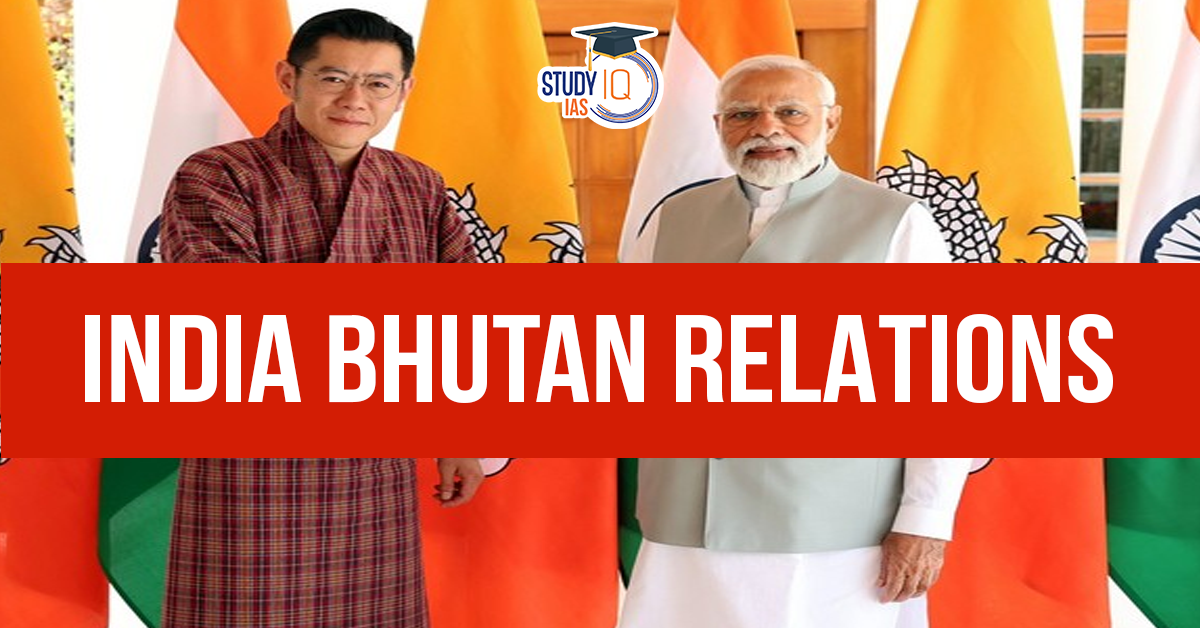Table of Contents
Bhutanese King Jigme Khesar Namgyel Wangchuck recently visited India.
India Bhutan Relations: An Overview
Evolution of Ties
India and Bhutan share a unique and special relationship that is based on a long history of cultural, economic, and political ties.
- Strategic Importance: Despite its small size, Bhutan occupies a strategically important position in South Asia and has been a key partner for India in regional cooperation efforts.
- Establishment of Diplomatic ties: Diplomatic relations between India and Bhutan were established in 1968 with the establishment of a special office of India in Thimphu.
- 1940 treaty of Friendship and cooperation: The basic framework of India-Bhutan bilateral relations is the Treaty of Friendship and Cooperation signed in 1949 between the two countries and revised in February 2007.
- The 1949 Treaty ensured peace and non-interference in each other’s internal affairs.
- The 2007 Treaty replaced the previous requirement for Bhutan to seek India’s advice on foreign policy and highlighted the importance of sovereignty and collaboration rooted in shared interests.
- The Golden Jubilee of the establishment of formal diplomatic relations between India and Bhutan was celebrated in the year 2018.
Areas of Cooperation and Significance
| Dimension | Details |
| Strategic |
|
| Economic |
|
| Cultural and Educational |
|
| Energy |
|
| Regional | Both nations cooperate in regional forums such as BIMSTEC and SAARC. |
| Environmental | India is supporting Bhutan in its efforts to become carbon negative. |
| Connectivity |
|
| Security |
|
Challenges In India-Bhutan Relations
- Chinese Influence: India backs Bhutan’s claim over Doklam as it is strategically important for India’s security.
- Dominance of the region by China could threaten the Siliguri Corridor, a narrow stretch that connects the Indian mainland with its north-eastern states.
- Issues in hydropower trade: India’s past changes in power purchasing policy, refusal to admit Bhutan into the National Power Grid, etc has created a rift in the relationship.
- Hideout for militants: Militant outfits like United Liberation Front of Assam (ULFA), National Democratic Front of Bodos (NDFB), etc use the dense forests of Southern Bhutan as their hideouts and operate against India.
- Operation All Clear (2003-04) was the first action against these militants by Bhutan.
- BBIN initiative: The Bangladesh-Bhutan-India-Nepal (BBIN) Motor Vehicle Agreement, proposed by India to improve connectivity in the region, is on hold by Bhutan due to environmental concerns.
- Access to trade: Bhutan is diversifying its market by reaching out to Bangladesh, with the two countries having signed a preferential trade agreement in 2021.
Way Forward
- Initiating Trilogue: Opening such communication channels can minimise uncertainties as questions of peace and conflict cannot be resolved by potential stand-offs (like Doklam) in the future.
- Diversifying economic engagements: For now, India’s economic relations with Bhutan continue to be dominated by hydropower projects.
- Strengthening collaboration in fields such as fintech, space tech, and biotech between the two countries can lead to a stronger partnership.
- Improving people-to-people ties: Soft power diplomacy can be induced through Buddhism and by encouraging more tourist exchanges between the two countries.
- Security measures: Establishment of contact points between countries and mechanisms for real-time sharing of information in criminal matters,
- Capacity building and skill development of law enforcement personnel manning border check-posts,
- Development of a Standard Operating Procedure (SOP) on repatriation for the Indo-Bhutan border.


 Places in News for UPSC 2025 for Prelims...
Places in News for UPSC 2025 for Prelims...
 New Phase of Operation Chakra to Combat ...
New Phase of Operation Chakra to Combat ...
 India-Middle East-Europe Economic Corrid...
India-Middle East-Europe Economic Corrid...





















